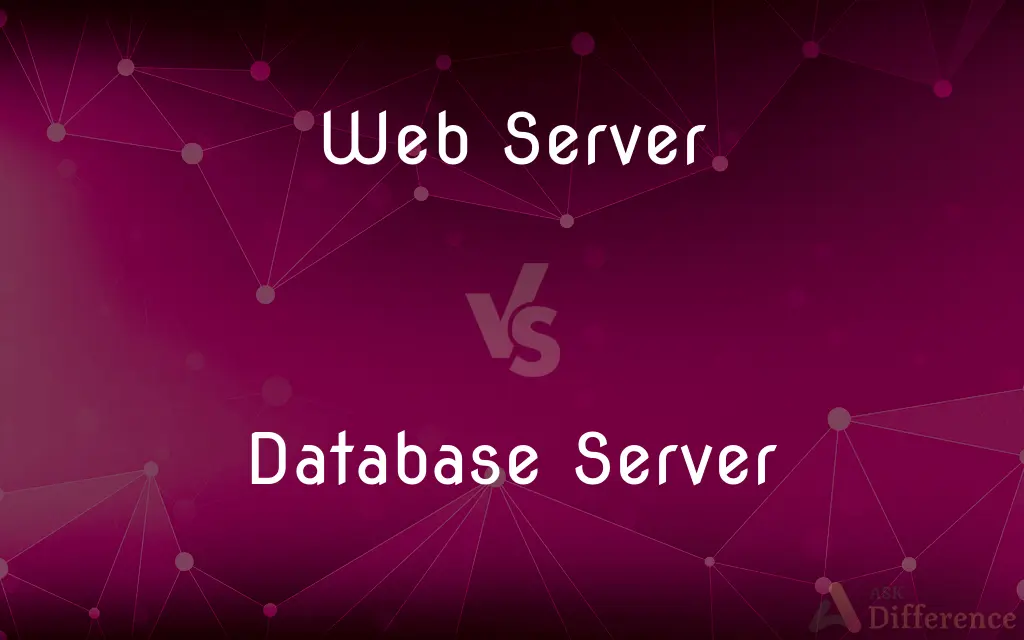Web Server vs. Database Server — What's the Difference?
By Tayyaba Rehman & Fiza Rafique — Published on October 22, 2023
A Web Server handles and responds to HTTP requests, serving web pages, while a Database Server stores, retrieves, and manages data in databases.

Difference Between Web Server and Database Server
Table of Contents
ADVERTISEMENT
Key Differences
When users access a website, their browsers communicate with the Web Server that hosts the site, asking it to provide the required web pages. These pages might be static, meaning they don't change, or dynamic, meaning they pull and display data on-the-fly. This is where the Database Server often steps in. Dynamic web pages will frequently reach out to a Database Server to fetch the latest data to be displayed.
Tayyaba Rehman
Oct 22, 2023
It's common in modern web applications for the Web Server and Database Server to work in tandem. When a user submits a form on a website, the Web Server receives this data, then it may send a request to the Database Server to store this data. Later, when that data is needed, the Web Server might ask the Database Server to retrieve it.
Tayyaba Rehman
Oct 22, 2023
A Web Server is a software or hardware system that uses the HTTP protocol to serve content, primarily web pages, to users' web browsers. On the other hand, a Database Server is a dedicated system that manages database services, offering a way to store, access, and retrieve data efficiently.
Tayyaba Rehman
Oct 22, 2023
In terms of architecture, the Web Server will often have resources like HTML files, CSS stylesheets, JavaScript files, and multimedia content. It's built to handle requests for these resources, ensuring fast and reliable content delivery. The Database Server, conversely, doesn't concern itself with these front-end resources. Instead, it focuses on managing databases—structured collections of data—which can be queried for information.
Tayyaba Rehman
Oct 22, 2023
In many scenarios, especially in large-scale applications, a Web Server may interact with multiple Database Servers, or vice-versa. This kind of architecture enhances performance, scalability, and redundancy. It's indicative of the clear yet interconnected roles that Web Servers and Database Servers play in the digital landscape.
Tayyaba Rehman
Oct 22, 2023
ADVERTISEMENT
Comparison Chart
Primary Function
Serve web content via HTTP
Store, manage, and retrieve database data
Tayyaba Rehman
Oct 22, 2023
Typical Content
HTML, CSS, JavaScript files
Tables, records, and relational data
Tayyaba Rehman
Oct 22, 2023
Interaction
Interacts directly with user browsers
Interacts with applications or web servers
Tayyaba Rehman
Oct 22, 2023
Performance Metrics
Page load times, HTTP request handling
Query processing times, database transaction rates
Tayyaba Rehman
Oct 22, 2023
ADVERTISEMENT
Definitions
Web Server
Can be software or hardware-based.
They installed a dedicated hardware Web Server to improve site performance.
Tayyaba Rehman
Oct 04, 2023
Database Server
Manages database services.
The Database Server efficiently processes thousands of data transactions.
Tayyaba Rehman
Oct 04, 2023
Web Server
A system serving web content.
The Web Server responded swiftly, delivering the webpage in milliseconds.
Tayyaba Rehman
Oct 04, 2023
Database Server
Essential for dynamic web content.
The Database Server provides real-time inventory data to the e-commerce site.
Tayyaba Rehman
Oct 04, 2023
Web Server
Hosts and delivers website resources.
The Web Server hosts all the images, texts, and scripts of a site.
Tayyaba Rehman
Oct 04, 2023
Database Server
Stores structured collections of data.
All user profiles are stored securely on the Database Server.
Tayyaba Rehman
Oct 04, 2023
Web Server
An intermediary between browsers and websites.
Your browser requests web pages from the Web Server when you visit a site.
Tayyaba Rehman
Oct 04, 2023
Database Server
Can be centralized or distributed.
The company switched to a distributed Database Server architecture for redundancy.
Tayyaba Rehman
Oct 04, 2023
Web Server
Handles HTTP requests and responses.
The Web Server receives HTTP requests and sends back appropriate responses.
Tayyaba Rehman
Oct 04, 2023
Database Server
Allows querying and data manipulation.
Developers run SQL queries on the Database Server to fetch needed data.
Tayyaba Rehman
Oct 04, 2023
FAQs
What does a Web Server do?
A Web Server serves web content, such as web pages, to user browsers via HTTP.
Tayyaba Rehman
Oct 22, 2023
What is a distributed Database Server?
A distributed Database Server spreads data across multiple machines or locations, enhancing performance and reliability.
Tayyaba Rehman
Oct 22, 2023
How does a Database Server function in the web ecosystem?
A Database Server manages databases, allowing web applications to store, access, and retrieve data.
Tayyaba Rehman
Oct 22, 2023
Can a single machine host both a Web Server and Database Server?
Yes, especially in smaller setups, one machine can run both a Web Server and a Database Server.
Tayyaba Rehman
Oct 22, 2023
How do Web Servers deliver dynamic content?
Web Servers fetch data from Database Servers to generate and serve dynamic content on-the-fly.
Tayyaba Rehman
Oct 22, 2023
What is a static web page in the context of a Web Server?
A static web page is pre-defined content served by the Web Server without real-time data fetching from a Database Server.
Tayyaba Rehman
Oct 22, 2023
Do all web applications need a Database Server?
No, but many web applications, especially those requiring data storage or dynamic content, utilize a Database Server.
Tayyaba Rehman
Oct 22, 2023
Are there security concerns with Web Servers?
Yes, Web Servers can be vulnerable to attacks like DDoS, XSS, and SQL injection.
Tayyaba Rehman
Oct 22, 2023
Can a Database Server be cloud-based?
Yes, many modern Database Servers are cloud-based, offering flexibility and scalability.
Tayyaba Rehman
Oct 22, 2023
What are common backup strategies for Database Servers?
Common strategies include full, differential, and incremental backups to safeguard data.
Tayyaba Rehman
Oct 22, 2023
How do Database Servers ensure data integrity?
Database Servers employ mechanisms like transactions, constraints, and backups to ensure data integrity.
Tayyaba Rehman
Oct 22, 2023
How do Web Servers handle traffic spikes?
Web Servers can scale resources, use load balancers, or employ caching to handle traffic spikes.
Tayyaba Rehman
Oct 22, 2023
Is a Web Server always online?
Ideally, a Web Server should be online 24/7, but issues like maintenance or outages can cause downtime.
Tayyaba Rehman
Oct 22, 2023
How can I access data stored on a Database Server?
Data on a Database Server is typically accessed using query languages like SQL.
Tayyaba Rehman
Oct 22, 2023
Why might a Web Server interact with multiple Database Servers?
To distribute the data load, ensure redundancy, or separate different types of data.
Tayyaba Rehman
Oct 22, 2023
Author Spotlight
Written by
Tayyaba RehmanTayyaba Rehman is a distinguished writer, currently serving as a primary contributor to askdifference.com. As a researcher in semantics and etymology, Tayyaba's passion for the complexity of languages and their distinctions has found a perfect home on the platform. Tayyaba delves into the intricacies of language, distinguishing between commonly confused words and phrases, thereby providing clarity for readers worldwide.
Co-written by
Fiza RafiqueFiza Rafique is a skilled content editor at AskDifference.com, where she meticulously refines and enhances written pieces. Drawing from her vast editorial expertise, Fiza ensures clarity, accuracy, and precision in every article. Passionate about language, she continually seeks to elevate the quality of content for readers worldwide.

















































